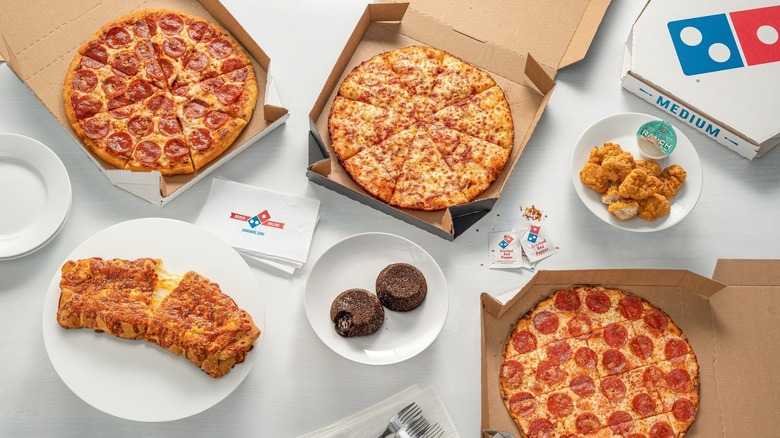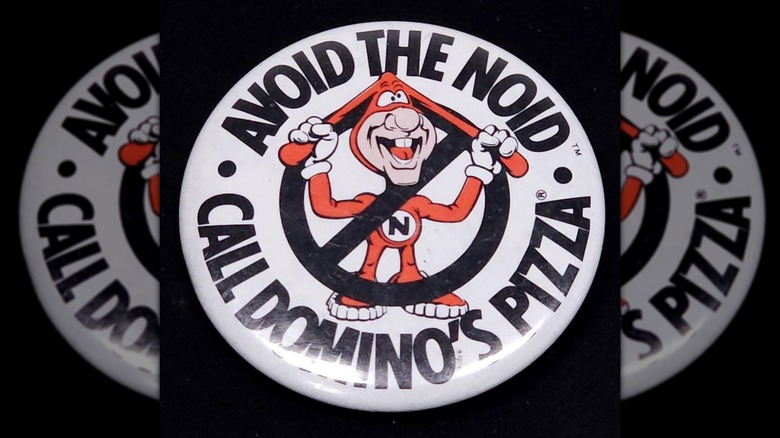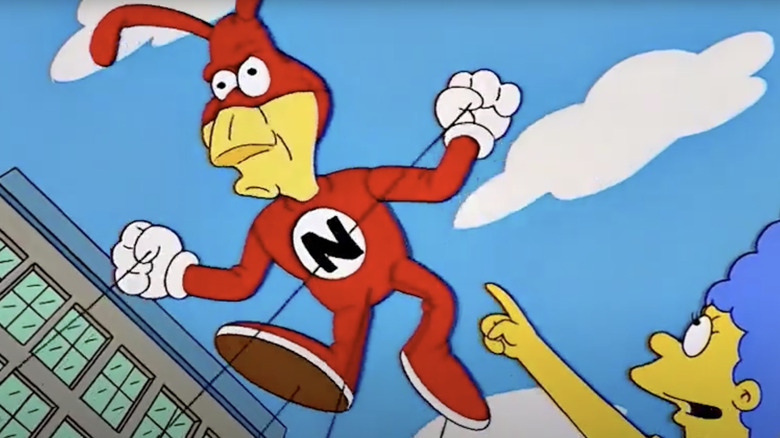Whatever Happened To Domino's Pizza Mascot?
We may receive a commission on purchases made from links.
In the world of brand mascots, some standouts have become iconic in their own right. Famous examples include Ronald McDonald, the burger-hawking clown; Wendy, the pigtail-wearing daughter of Wendy's founder Dave Thomas; and that creepy king with the oversized plastic head who served as Burger King's mascot for a while. In the pizza realm, Domino's once had a popular mascot that appeared in highly successful ad campaigns. Ultimately, though, the character was discontinued following a tragic, real-world event.
Many kids of the '80s remember commercials that warned consumers to "avoid the Noid." The Noid was a Claymation villain bent on preventing pizzas from being delivered to Domino's customers. He was a strange figure, wearing a red jumpsuit — reminiscent of a superhero costume — complete with red antennae (or perhaps bunny ears — it's hard to say). He didn't speak, instead jabbering in a way that somewhat resembled a chattering rabbit. His pizza-blocking tactics ranged from spraying boxes with a freeze gun — turning them to ice until they shattered into cubes — to zapping them with a magic wand.
As kooky as the campaign was, it worked. The Noid — short for "annoying" — became an icon of '80s pop culture and helped propel Domino's to its status as a top pizza chain. The company, however, stopped using the character after it became tragically linked to a hostage situation and suicide.
The rise and fall of the Noid
Domino's launched its first Noid campaign in 1986 to great success. The character was created by the same artist who designed the California Raisins. The Noid served as a sort of anti-spokesmen for Domino's famous "30 minutes or less" guarantee, which originally promised a free pizza if delivery took longer than 30 minutes (later amended to a $3 discount).
The Noid was featured in many TV commercials, and he also had his own Nintendo video game. The character even cameoed in the music video for Michael Jackson's song "Speed Demon," which was a featured segment of the King of Pop's anthology film "Moonwalker."
It seemed the Noid was on top of the world, as restaurant mascots go. But then tragedy struck. In 1989, a mentally ill man named Kenneth Noid became convinced that Domino's had created the cartoon to publicly mock him. The 22-year-old entered a Domino's restaurant armed with a gun and held two employees hostage for several hours before they escaped. During the standoff, Noid ate pizza from the restaurant. He was eventually arrested and charged with kidnapping, aggravated assault, and theft, and Domino's ceased using the Noid in its advertising.
Kenneth Noid was declared insane and institutionalized rather than imprisoned. He later died by suicide.
Brief reappearances of the Noid
Though Domino's Pizza stopped using the Noid as its mascot, the popular Claymation character has popped up a few times over the years. In 2011, Domino's briefly revived the Noid for a promotional Facebook game called "The Noid's Super Pizza Shootout," where players could win pizza coupons. The character also appeared in animated shows like "The Simpsons" and "Family Guy," meeting a fictional demise in the latter.
In 2021, Domino's brought the Noid back again, this time in video game form. He appeared as a mini boss in the mobile game "Crash Bandicoot: On the Run!" as part of a Domino's collaboration. That year, the Noid was also featured in Domino's TV ads promoting experimental autonomous pizza delivery vehicles.
Domino's additionally offered limited-edition Noid T-shirts and stainless steel Noid drinking tumblers in 2021. The chain made a point of disclosing that sales of the items would not be taken as profit by the company. Instead, proceeds from the merch would benefit the nonprofit Domino's Partners Foundation, which provides financial assistance to Domino's employees who are in need due to events like natural disasters, family deaths, and medical challenges — including mental illness events.
If you or someone you know is struggling or in crisis, help is available. Call or text 988 or chat 988lifeline.org



